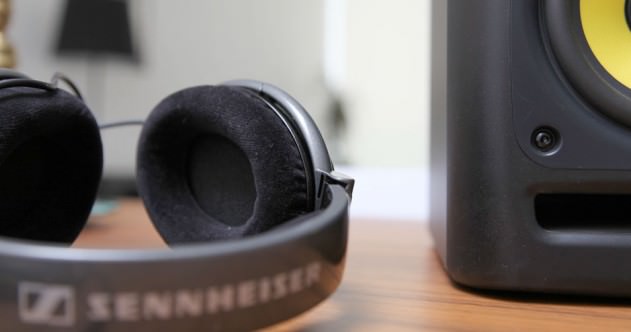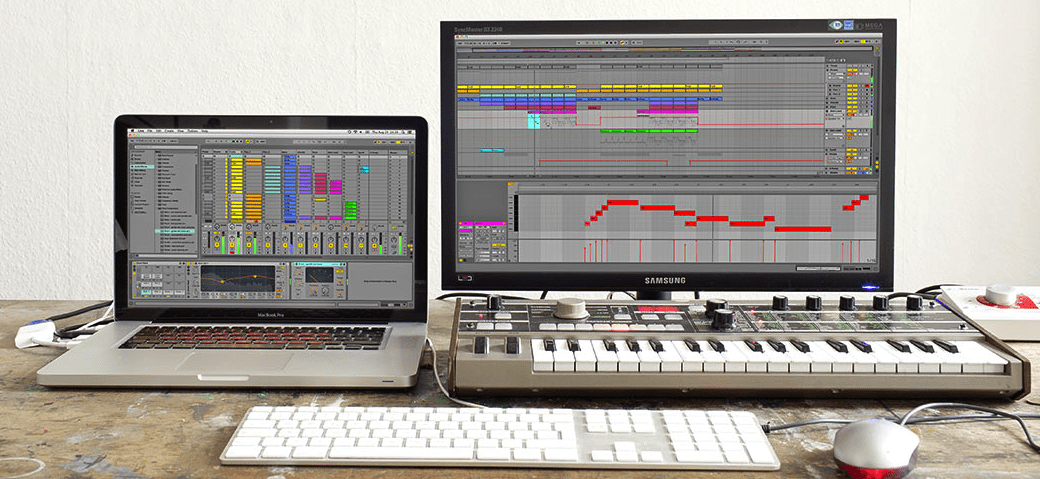Headphones

A decent pair of headphones may not change your life, but they’re an essential studio accessory for many producers. Even if you have a decent monitoring setup, headphones can still play a part in your workflow.
In a home studio setup the most obvious benefit may be in allowing you work long into the small hours without disturbing the neighbours, but a good pair of monitor headphones also provides a useful secondary listing source. Being clamped so tightly to your ears, they avoid any problematic room acoustic issues, though it is fair to say that they may have their own deficiencies when it comes to low-end extension and smoothness. Headphones also play an essential role if you’re looking to record vocals. Low-quality headphones will make recording a decent vocal take a lot harder.
For all-round studio use, closed-back headphones usually make the best choice. However, although they potentially offer better low-frequency extension, the overall sound field can sometimes feel smaller than with open-back designs. This does mean you’ll need to pay special attention to panning, and as with all headphones there is a temptation to pull back on reverb, making mixes drier than they perhaps need to be. Also be aware that some consumer-oriented headphones hype the bass end, and this may not be what you need when trying to achieve a well-balanced mix. Headphones, like monitors, are a very personal choice. Avoid choosing a pair on the internet and buying by mail order if possible. Trying them out in person is always the best option with headphones to ensure you get something which suits your personal taste.

07.59 PM
Thanks a lot for this very usefull article.
08.59 PM
Great article : one doesn’t need lots of stuff to achieve great ideas.
Always focus on the ideas, not on the gear.
I would also add that a few cheap tricks can strongly improve your listening accoustics. Read SoundOnSound articles in their archives on that matter (Studio SOS). I lost so many many years working in poor acoustics. Now that I solved this problem is like if I had a new pair of expensive speakers.
09.16 PM
On a 24bit system, you have to have your master at -72db to mix at 12bit, I frankly doubt anyone mix at those levels.
11.14 PM
finally someone’s addressed the reality of the situation. some much needed pragmatic advice
12.29 PM
Nice article that addresses many things that I have stumbled on. Such as when I adjusted my seat to my keyboards high enough caused me legs to hurt above and behind the knees because my feet didn’t touch the floor well enough. The solution was to lower the keyboard stand.
Few hints and my learning experience:
The modern computer master volume is outside the bit domain of the soundcard. and won’t cause degradion Use that if you have nothing else. Even the most basic built in audio chipset is at least 24 bit nowadays anyway.
The german Beat magazine has several free plugins that are excellent.
drumMic’a is a good free drum plugin.
I spent around 9 days in selecting a DAW few years ago. A one called Energy XT was by far the easiest to learn in my opinion. but deceptively powerful. The drawback is that the looks are dated and until recently not in much development.
I own now couple of other DAWS, but it is still my favorite.
Cakewalk has often excellent sales on their synths and their entry level DAWs at great discounts.
Isotope Nectar Elements is often on sale and powerful and easy to use plugin for voice.
Today I mainly use 3 commercial synths. The reason is that I invested time in studying them (as this artivce recommends and found that I could do virtually anything that I need). One is sample based, one a hybrid and the third is analog.
I found out I was spending to much time in checking out free synths. Don’t do the same, select rather few and stick to them.
I use mostly free effects or the ones that come with my DAW’s, (apart from Nectar Elements). I find it sufficient and think it will suffice most people (non pros).
I found creating a whole song a bit overwhelming. By sticking to smaller pieces but doing them well increased my confidence.
My other weak point was lack of experience with drums. Using and studying midi drum clips and modifying them rather then creating new beats, helped a lot in the beginning.
Also realizing that I spent too much time in tweaking sound of the beat in the beginning as I had wrong ideas of how it would sound in the final mix.
02.48 PM
Yup – even though on a 24bit system, using only 12-bits is theoretically down at -72db and Javier Z mentions that people don’t mix at that level, you’d be surprised at the way some people set their gain structure in a DAW – especially when using buses/groups, and then use the DAW’s output level as an overall monitoring volume control.
So 12-bits isn’t necessarily common, but i’ve seen it.
12.21 PM
Speaker placement:
” NOT TOO NEAR THE REAR WALL, ”
Well, Genelec recommends to keep the speakers either on the back wall or over 1 meter from the backwall. Backwall being as good as one meter. For most homestudios it’s better to have speakers on the backwall for most controll over the sound.